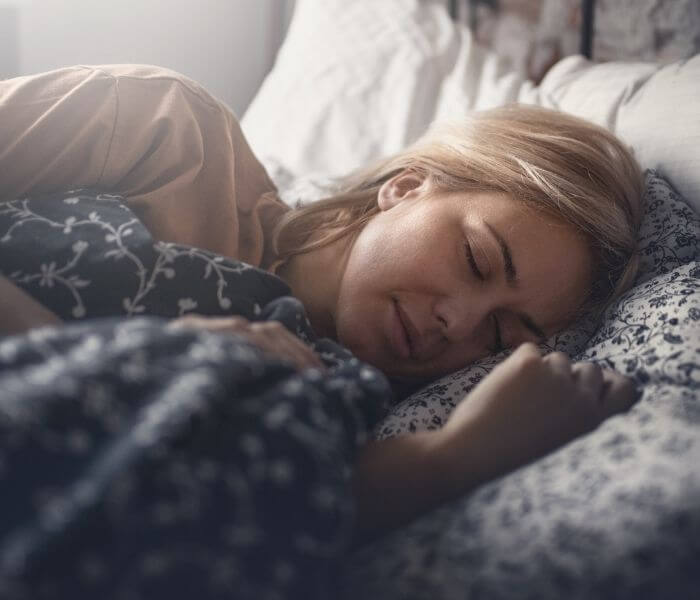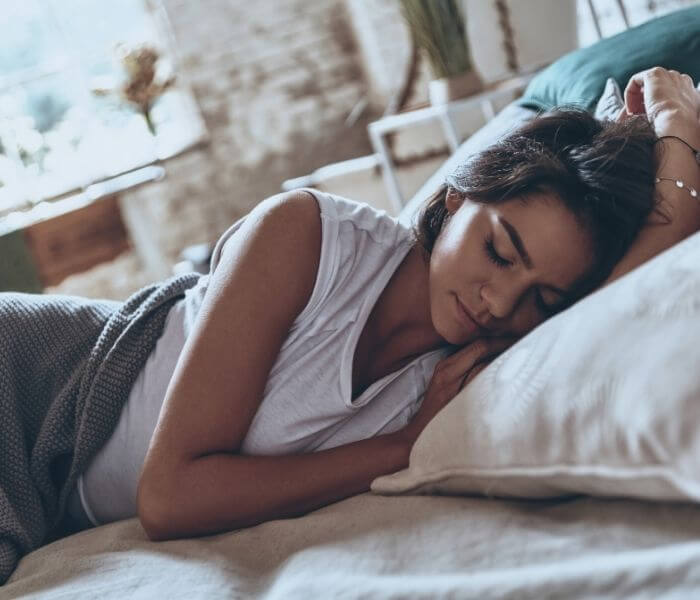
What Is Sleep Hygiene?
Sleep Hygiene is the term used to describe a number of science-backed practices that are carried out during the day and just before bed that help to create the exact conditions needed to sleep well.
Our bodies have an inbuilt clock called the circadian rhythm which regulates our sleep and wake cycles across a 24-hour period. The circadian rhythm coordinates both physical and mental processes throughout the body and plays a role in[1]:
- Sleep-wake cycle
- Endocrine system which regulates hormone release
- Digestive system
- Regulation of blood sugar levels[2]
- Regulation of cholesterol levels
- Cognitive function and mental health
- Immune system
When our circadian rhythm becomes unbalanced it has a wide-ranging impact on our physical and mental state, resulting in disturbed sleep.
In this article, we take a look at the main areas of sleep hygiene that help improve sleep and what to do if these techniques do not work for you.
How Do You Practise Good Sleep Hygiene?
It might sound complicated, but sleep hygiene is about creating habits that help you improve your sleep. Small changes over a long period of time can build up to become long-term habits. We’ve outlined some key areas to focus on below to help you get started.
Set Your Sleep Schedule
Wake up at the same time every day
Waking up at the same time every day can help create a rhythm to your sleeping patterns. It might be tempting to lay in on the weekend, but this will make it harder to fall asleep later that day, which can have a knock-on effect through the week.
Avoid naps
A quick nap can be helpful to recharge your batteries if you’re feeling tired during the day. But long naps can interrupt your sleeping pattern and throw off your sleep cycle, making you more tired the next day. Avoid naps if you can, or keep them under 20 minutes.
Make sleep a priority
Staying up late to watch TV or socialise can reduce the amount and quality of sleep. Aim for 7-8 hours of sleep per night and work out what time you need to be in bed based on your wake up time and try to stick to it.
Small changes make a big difference
If you’re struggling with sleep, small changes can be more effective in building habits and improving your sleep quality. Set realistic goals, such as moving your bedtime earlier by 10-15 minutes every few days. This will make the process more manageable and make you less likely to fall back into old habits.
Follow a Routine
Be consistent
Consistency can help formulate habits, and good habits can make things much easier to manage. Being consistent with your pre-sleep routine, such as brushing your teeth, changing into pyjamas and turning off devices, can help shift your mind to bedtime mode.
Create time to wind down
Allow yourself some time before bed to wind down and get your mind ready for sleep. Light stretching, breathing exercises or reading are a few good ways to relax the body and mind, which can help you fall asleep easier.
Dim or turn off lights
Your body has a sensitive internal clock, known as your circadian rhythm. Your body releases a hormone called Melatonin after dark, which helps facilitate sleep. Turning off lights can help maintain your circadian rhythm, which in turn can regulate your hormones correctly, giving you a better night’s sleep.
Avoid screen time
It’s best to turn off all devices at least 30 minutes before you sleep. Screens from phones, laptops and TVs emit blue light, which can interfere with melatonin production.
Cultivate Healthy Daily Habits
Get outside
Just as reducing light at bedtime is good for managing your circadian rhythm and the hormones associated with this natural body clock, getting outside in the morning and throughout the day is good for it too. In particular, it helps regulate your cortisol levels which are highest when you first wake up and lower throughout the day.
Exercise
An active lifestyle can help to improve your sleep. Adults need 150 minutes of moderate exercise a week, according to the NHS, which can not only improve your sleep but your mental and physical health, too.
Avoid tobacco and alcohol
Alcohol and tobacco can cause serious health risks, but they can also be detrimental to your sleep, which can have further knock-on effects to your health. A Canadian study found a direct link between tobacco and sleep problems. And while a drink might help you fall asleep quickly, it’ll reduce your quality of sleep and you may find you wake up more often during the night.
Avoid caffeine after lunch
Caffeine is a stimulant, meaning it keeps you wired even when you want to relax. The half-life of caffeine is between 3-5 hours, meaning it takes your body up to 5 hours to stop feeling the effects of it. Because of this, you should avoid caffeine in the afternoon, as well as using it as a way to feel less tired in the morning.
Don’t eat late
Eating a big meal before bedtime can make you uncomfortable, making it harder to relax and fall asleep. If you need to eat late, keep it light.
Optimise Your Bedroom
Make your bed comfortable
Invest in some pillows that support your head and neck and replace any that have had their day – the same goes for your mattress. Your duvet matters too. It may be worth getting a summer and winter duvet, so you can swap them out to stay comfortable throughout the year.
Choose the right Temperature
Some studies suggest you should sleep in a cool room, with doctors recommending room temperature between 15 and 20 degrees Celsius[3]. Colder rooms help your body to regulate better whilst you sleep, reducing sleep disturbance.
Manage Light
Your circadian rhythm is influenced by light. Blocking out light with black-out curtains or an eye mask at night is a great way to kick your circadian rhythm into action, helping it to start your sleep cycle. The same applies in the morning. Open curtains when you wake up or get a sunrise light to help you wake up.
Drown Out Noise
Noise can affect your relaxation too. Unwanted noise like traffic and neighbours can be hard to drown out, but you can control the noise in your home. Turn off any appliances that hum (not your fridge!) or make a noise, such as speakers. Ear plugs can help drown out more noise, but make sure you don’t sacrifice comfort. You might find some noise relaxing, such as white noise or rain.
Stop Trying To Sleep
If you ask someone who doesn’t have a sleep problem how they get to sleep they will most likely say, ‘well, I go to bed, turn off my light and go to sleep’.
Yet, if you ask someone suffering from insomnia what they do to fall asleep it may go something like this…’ I don’t eat too late, I wind down an hour before bed which includes a warm bath, I make sure my room is cold and there is no noise or light to interrupt my sleep, I read until I’m sleepy and if I don’t fall asleep, I get up and go downstairs.’.
Understandably, people who suffer from severe sleep problems are desperate to get a good night’s sleep and will do anything to make that happen. But that’s the problem, they are trying too hard to make it happen.
The difference is the amount of ‘doing’, someone who doesn’t have a sleep problem does nothing to get to sleep. Our bodies know how to fall asleep, we just need to learn to get out of the way. This is where ACT comes in – Acceptance and Commitment Therapy.
ACT
Advocates of ACT such as the Sleep School teach people to accept what is happening and learn mental flexibility and openness to uncomfortable situations rather than struggling against them. In other words, stop struggling against not sleeping.
Learning to accept that you cannot sleep along with adopting other ACT techniques, helps to improve your relationship with sleep. Over time, it teaches you to relax and accept whatever comes up in the mind or body. It teaches you that resting in bed and adopting mindfulness techniques, as opposed to getting up, is far better in aiding rest. Although rest is not as good as sleep in terms of restoring the mind and body, it is giving the body some chance to recoup from the day. More so than getting up.
In some cases, people who suffer from sleep problems have lost their relationship with sleep and sleep is seen as an issue they have to solve – like any other problem in life. But ACT and mindfulness aim to improve that relationship you have with sleep.
Summary
Practising good Sleep Hygiene can help your body’s circadian rhythm stay in balance, helping you to get a restful night’s sleep. This in turn helps your body recover from the day and has a long term positive impact on your physical and mental health. It helps keep your immune system strong, supports hormone health and helps regulate the body’s metabolism.
When Sleep Hygiene doesn’t work, as in the case of insomnia, then other techniques need to be employed to help your mind and body get back into their normal rhythm of sleep. This is where techniques such as ACT and mindfulness can help people overcome insomnia and anxiety related to not sleeping[4].
- Health scores calculated
Close
This information has been medically written by Dr Thom Phillips
Thom works in NHS general practice and has a decade of experience working in both male and female elite sport. He has a background in exercise physiology and has published research into fatigue biomarkers.

Dr Thom Phillips
Head of Clinical Services
Related articles
Like this article? Here are some more based on similar topics.




